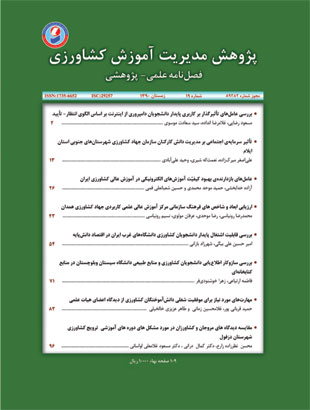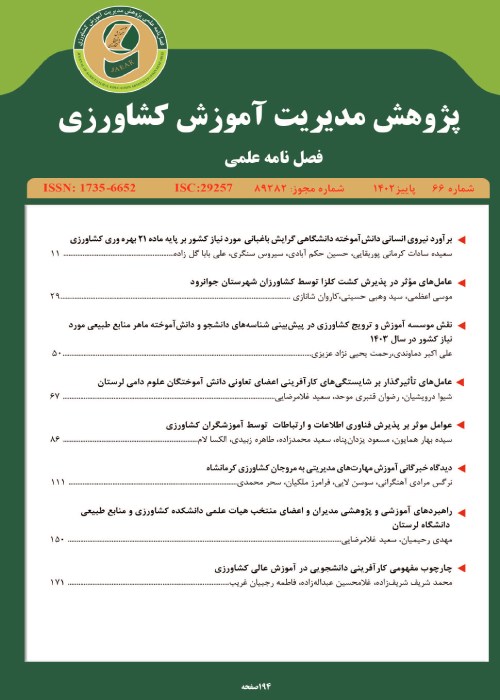فهرست مطالب

نشریه پژوهش مدیریت آموزش کشاورزی
سال سوم شماره 19 (زمستان 1390)
- تاریخ انتشار: 1390/12/29
- تعداد عناوین: 8
-
-
Page 2The major goal of this study was to investigate factors affecting continued internet usage by animal husbandry students based on expectancy-confirmation model. A survey approach was used in this research. The study population was B.Sc. and M.Sc. animal husbandry students at Isfahan University of technology who were selected by applying proportional stratified sampling technique. The sample size for students was 85. A questionnaire was developed to gather the data. The instrument validity and reliability were confirmed based on the opinions of a panel of experts and Cronbach’s Alpha coefficient (α=0.70 - 0.83) respectively. The findings of the research indicated that there was a positive significant relationship between animal husbandry students’ continued internet usage and their satisfaction, perceived usefulness and perceived enjoyment. The results of path analysis revealed that satisfaction, confirmation and perceived enjoyment had a significant influence on continued internet usage by students.Keywords: Agricultural education, animal husbandry student, Expectancy, Confirmation theory
-
Page 13
The main purpose of this study was investigating the effect of social capital on knowledge management of the staffs of Jihad-e-Agriculture organization in sothern counties of Ilam province. Statistical population consisted all staffs of jihad-e-agriculture organization in Abdanan, Dareshahr and Dehloran counties (N=168), that 116 individuals were selected as research sample with using random stratified sampling method with proportional assignment. The main instrument in this study was questionnaire which its validity was confirmed by the panel of experts and its reliability was confirmed by Cronbach's Alpha coefficient (α> 0.70).Data was analyzed by SPSSwin16 software. Results showed that level of social capital and knowledge management between Jihad-e-Agriculture staffs was moderate level. Results of correlation analysis showed that there was positive and significant relationship between social capital components (cooperation and voluntary participation, collective identity, mutual cooperation, communications and responisiveness, trust, collective coherence, networks and common norms) and knowledge management. Also, findings of path analysis showed that among social capital components, networks and common norms component with total effect of 54.1 % had the most effect and voluntary participation component with totall effect of 6% had the lowest effect on knowledge management of Jihad-e-Agriculture staffs and totally social capital components explained 50.7% of knowledge management variations as dependent variable.
Keywords: Social capital, knowledge management, common norms -
Page 26The objective of this survey research was to analyze barriers of E-learning quality improvement in Iranian agricultural higher education. Statistical population of the study consisted of 65 faculty members (N1=65) and graduate students of Iranian agricultural colleges (N2=8541), out of which 286 students were selected as sample using Cochran formula and proportionate stratified sampling technique. Data were collected by questionnaires developed for the study. Validity of the questionnaires was approved by a panel of experts. In order to measure reliability of the questionnaires, Cronbach Alpha coefficients was calculated (α = 0.95 for faculty member's questionnaire and α2= 0.92 for student's questionnaire). Results of prioritizing barriers of quality improvement of E-learning showed that the three most important barriers were slow internet speed, lack of necessary hardware infrastructure and lack of necessary software infrastructure (as perceived by faculty members); and slow internet speed, lack of necessary software infrastructure (such as appropriate educational softwares), and lack of necessary support system during the implementation of E-learning courses (as perceived by students). Also, results of discovery factor analysis showed that as perceived by faculty members, five factors explained about 77.88 percent of variations: education- information, support, infrastructure, financial- policy and skill; and as perceived by students, five factors explained about 62.62 percent of variations: communication – policy, education – skill, infrastructure, financial- support and psychological.Keywords: Barriers, quality improvement, E, learning, agricultural higher education
-
Page 43The main purpose of this study was to assess traits and indices of organizational culture in Hamedan Agricultural Applied-Scientific Higher Education Center. For this purpose, the Denison's model was implemented. The model contains four traits of cultures involvement, consistency, adaptability, and mission. There are three indices to measuring each of these four traits. A survey research methodology was applied and statistical population of the study consisted of 80 academic staff during 2010-2011 academic year. Out of this population, members were randomly selected using Cochran's formula. Data gathering tool was Denison's questionnaire version 2001. The reliability of the questionnaire estimated by Cronbach’s Alpha, α= 0.89. Results show that the highest score was related to mission trait, in contrast, the lowest score related to adaptability. Of total 12 indices, strategic direction, and core values were in the highest and customer focus and team orientation were in the lowest level that should be improved. Furthermore, the results revealed that in the mentioned institute the mean magnitude was under moderate level in all four traits (involvement, consistency, adaptability, and mission), as well as the most correlation was observed between involvement and consistency cultures.Keywords: organizational culture, involvement culture, consistency culture, adaptability culture, mission culture
-
Page 54Appearance of knowledge-based economy, role of universities has been highlighted in providing employable graduates much-needed in current competitive marketplace towards national economic development. This descriptive-correlational research sought to measure employability level of agricultural students searching a sustainable job in the knowledge based economy; and to determine factors interfering in the construct. The population for this study was senior agricultural students of public universities (Kordestan, Kermanshah, Ilam, Hamedan, and Lorestan) in west of Iran (N=979). Through a stratified random sampling 274 students were selected. Data indicated that employability level of students to get a sustainable job were moderate. Discriminant analysis revealed that level of skills of knowledge-based economy and internal ambitions were respectively the most important factors that discriminated agricultural students regarding capability of getting a sustainable job. It can be recommended that orientation training, linkages of higher education and labor market, performance evaluation of graduates, career advisory on self-directed education and self-development; and more use of information technology in classroom could foster employability of the graduates.Keywords: Employability, agricultural student, knowledge, based economy, sustainable
-
Page 71This research was implemented with purpose of library investigating information seeking behavior among students of the University of Sistan and Baluchestan (faculty of agricultural and natural resources, Saravan) and in general frame work of survey-descriptive researches. The statistical population of the study consisted of all students in different fields of agricultural and natural resources (N=510) that by using stratified proportional random sampling, 140 students were selected and data collected by using of questionnaire. SPSS/win 13 software was used for process of data analysis that consisted of variables: amount of awareness about skills of information seeking behavior in libraries, amount of library resources awareness, using of human resources for receiving of information and referring to human resources. The findings revealed that students’ information seeking behavior in library was weak. In ranking of skills of students’ information seeking behavior in library, asking of librarians and classmates was the most important human resource for referring in library. Also, findings about comparison of among gender, level of education and educational field of students with their information seeking behavior in library doesn’t indicate any significant difference. According to regression analysis, explanation variables of satisfaction of library, using of human resources for receiving of information and academic achievement (GPA), in to prioritize the importance explanation, 62.4 percent of dependent variable variations totally.
-
Page 83Agricultural colleges are the most important institutes in agricultural education to educate and train specialists, conduct research projects, produce useful knowledge, offer the required advisory services for society, as well as to improve competencies needed for graduates’ employment. The purpose of this study was to analyze competencies need to agricultural graduates their career succeed in the future from the perspective of agricultural faculty members. This descriptive correlational research used survey technique to gather required data. Research population faculty members at the college of agriculture, Shiraz University in the academic year of 2010-2011. The data collection tool a questionnaire confirmed face validity by a group of agricultural extension and education specialists and test-retest to reliability. Correlation coefficient range at different scales of the questionnaire was between 0.71 0.95. Required skills and competences of students to achieve the expected job and career success were studied in four parts; professional, technical, general and personality characteristics. The results showed that current status of students in all four needed competency graduateshave a significant gap with the ideal condition. Based on research findings, it is recommended that agriculture fields be introduced in high schools, also, university courses direction must be toward improving practical competencies needed by agriculture graduates.Keywords: Job ability, acquiring competency, agriculture graduates, employment
-
Page 96This study examined and comparison extension agents’ and farmers’ view towards in the agricultural extension education problems in Dezful. It way a descriptive study applying، survey method. The statistical population consisted of 5060 farmers and 50 extension agents. All extension agents were studied due to their small population and a sample of 466 farmers was selected based on the stratified ratio sampling method. The instrument was a researcher made questionnaire. For the purpose of data analysis، the statistical procedures including t test،، and factor analysis. The findings of factor analysis on the views of extension agents indicated that these courses dealt with problems such as usage of uniform methods of instruction for teaching content of the courses by extension agents، lack of insufficient information about the time of courses to farmers، and lack of incentives for creation motivation in farmers. Also، the findings of factor analysis on the views of farmers indicated that these courses encounter problems such as inadequate instruction and assistant equipments usage by extension agents،incompetent employment of knowledgeable and experienced extension agents corresponding to updated agricultural issues، lack of conformity in courses with time conditions of farmers، and ignoring the opinions of farmers in the arranging courses.Keywords: Agricultural extension, agricultural extension training courses, view of extension agents, view of farmers, Dezful


